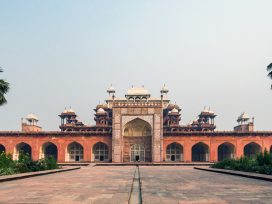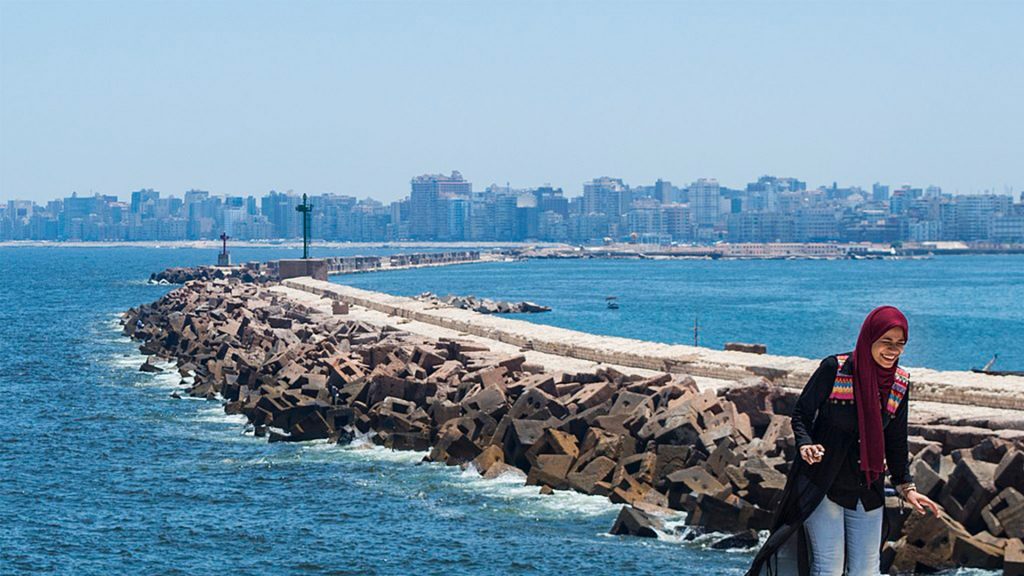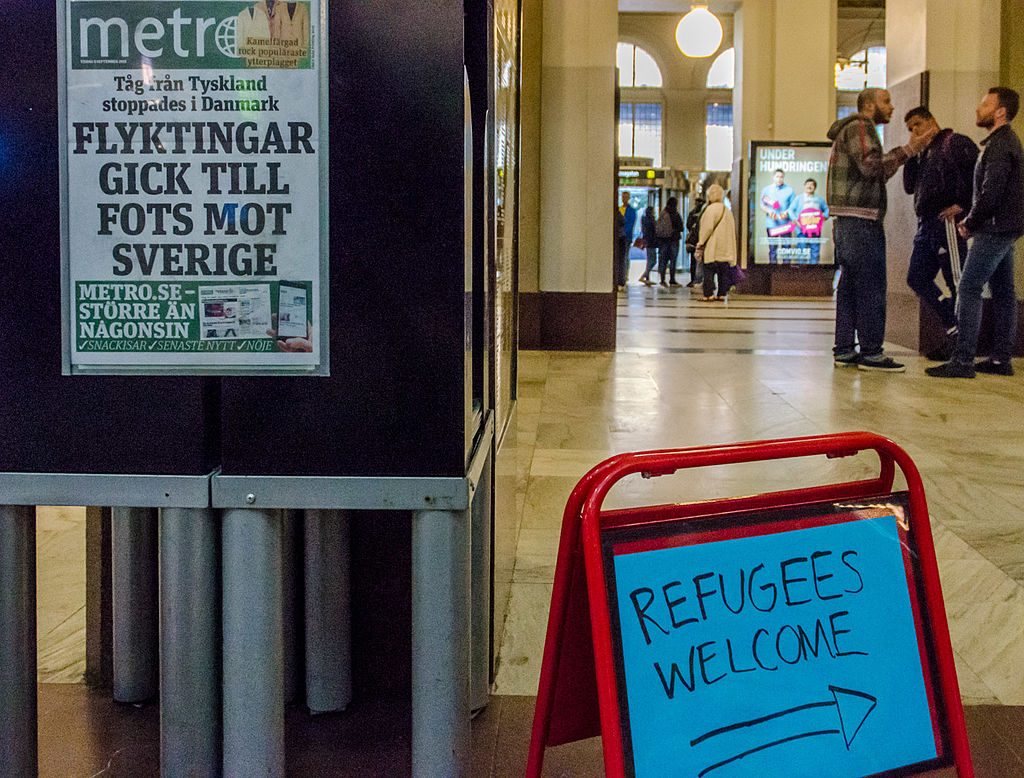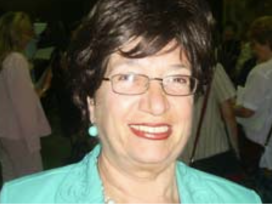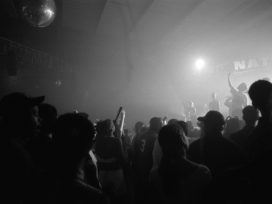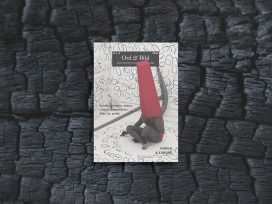Antje Scharenberg: You have been living and working in Gothenburg for several years. How do you see the political situation in Sweden at the moment?
Rasha Shabaan: I actually still consider myself to be an external observer of Swedish society, culture and politics. But let me answer your question with an example of something that happened recently. In Sweden, and not just in Sweden but across the Nordic countries, there is a political party called the Nordic Resistance Movement, a neo-Nazi movement that has been getting more and more powerful in terms of being allowed to organise demonstrations. There is an annual political event in Sweden called Almedalen, where politicians from all the political parties meet and organise discussions and seminars for a week. It takes place in and around Almedalen Park in Visby, on the island of Gotland. Last year the Nordic Resistance Movement was given a license which allowed it to be at the event and to hold a demonstration. As a result, there were attacks and a lot of confrontations, especially with LGBTQ activists. Some of the biggest organisations that represent LGBTQ people and campaign for a better understanding of diverse sexualities, such as the Swedish Association for Sexuality Education and the National Association for LGBTQ people, have therefore decided that they are going to boycott the Almedalen this year. This gives you a sense of the impact in Sweden of a trend towards tolerance of the far right.
What is your view in general on where Europe is at today politically?
One of the things I’ve noticed from my work and from living here in Sweden is that Sweden is very Sweden-centric, then Nordic-centric, then Eurocentric. Since Brexit, Europe ‘has lost its flavour’, as we say in Arabic. I thought we were going to see demonstrations in Sweden to go hand in hand and to show solidarity with the people of the UK who wanted to remain. But it seems like people lost the value of solidarity at the time of what has been described as the ‘refugee crisis’ of 2015. Since 2016, until today – this very moment that we’re talking to each other – Sweden has had border controls between itself and Denmark.
Your work brings people together across borders, and in particular across the Mediterranean. How might the Mediterranean work as a starting point to think about how Europe might be otherwise?
The work of Gianluca Solera, especially his work on a Mediterranean Citizens Assembly, and how we might create a dialogue between cultures across the Mediterranean, is interesting in this regard. I was born, grew up and lived until I was almost thirty years-old in Alexandria, a Mediterranean city. If you ask me what my identity is, I will tell you I’m an Arab, and then I’m a Mediterranean, Muslim and so on. But being Mediterranean is a really, really important part of my identity. People from the Mediterranean have a lot in common, more than we think we do. When I was in Greece last summer for a wedding, and people asked me ‘where are you from?’, I said I’m from Alexandria. And when you say you’re from Alexandria, you are kind of saying ‘look! we have a lot in common!’
At the same time, there are all these differences. Living in Europe is almost like a utopia, like living in a luxurious, gated community, while everywhere around you, people are dying, LGBTQ people are being persecuted, poverty, climate change, hate speech, everything. And then all of these shootings in mosques and synagogues, and the persecution of Roma people. I go to Egypt three times a year to see my family. And sometimes I just sit, especially on the plane on the way back, and I’m thinking ‘my goodness! the gap is so huge!’ It’s so unfair. I mean it is fake democracy, it’s not for real, when you have all of these things happening and people still do not take to the streets. There are a lot of initiatives, there are still people trying to demonstrate, but the media is not helping very much in talking about these things. And this is why I’m really interested in storytelling, as a way of making these separations and segregations visible.
Your work revolves a lot around creating intercultural dialogues through storytelling. Can you say more about how you got into this and how it works?
I had the luxury of coming from Copenhagen Airport to Sweden with all my luggage and moving with everything that I owned. But I’ve also seen Syrian families arriving at Malmö with the border control, who were just taken off the train. Later on, I started to meet more and more newcomers and they were all saying ‘where are the Swedish people? We don’t meet any Swedish people, we don’t know where they are’. That’s when I realised that what is required is to bring people together using storytelling. Especially because racism in Sweden is one of the most dangerous kinds because it’s implicit, it’s often hidden.
I’ve been working my whole life with intercultural dialogue. With a project called iHopP! – a mash-up of the Swedish words ‘ihop’ (together) and ‘hopp’ (hope) – we started to produce digital stories of newcomers and locals, stories about hope. We ran workshops and screened stories of people talking about their lives, about what they want to become now that they have moved to Sweden.
Another project in which I used storytelling was called ‘Mind the Gap’, it’s been running now for almost two years. It’s again using digital storytelling, asking people to talk about gaps in their lives. These gaps could be the result of a generation gap. They could be the result of being away from home. They could be the result of a loss, or missing someone. And it could also arise as the result of a lack of opportunities, which creates a gap in your life. We did one project in Gothenburg where we brought refugees and newcomers together with locals. We also did one in Jordan, with Egyptians and Jordanians and Swedes. Here, a lot of participants talked about a sense of ‘in-between’ identity: what is it like to be born and raised in Sweden by migrant parents, when you don’t look blonde. What does it do to you? What does it create?
Can you give an example of one of the stories you came across in this project?
In one of the filmed stories, you see a Swedish girl talking about her mum losing her child, and an Egyptian woman also talking about the loss of her first baby. They didn’t know the other was going to talk about this – the idea was that you enter the room and you tell the story in your own mother tongue. And I could tell you many more stories. I just love how storytelling is empowering and that it shows how similar we are, how much we have in common. We actually refer to a quote from Hannah Arendt: ‘We humanise what is going on in the world and in ourselves only by speaking of it. And in the course of speaking of it we learn to be human.’ I remember in one of our very first projects, there was a man from Syria, who in his story talks about the first time he left Syria, and how, lighting up a cigarette after stepping out of the airport, he could finally breathe freedom. But now that he is enjoying freedom, he wishes the same for his friends who are stuck back in Syria in the war, hunger and all the suffering. He was feeling quite desperate, thinking ‘what am I doing here in Sweden, I have to start all over again’. But actually, when he watched himself telling this story, it helped to empower him.
Having worked across various conceptual, cultural and geographical borders, what would you say are some of the biggest challenges? What have you learned?
Europe itself is not actually that culturally homogenous. This is one of my observations about this continent. First of all, as opposed to Arab culture, you don’t really have a common language. A German and a Swede are not the same. This is something that you need to take into consideration, the different realities. I mean, an eastern German is also different from a western German. That is also something that is very interesting. There is a need for intercultural dialogue, even within Europe.
But there are not only cultural gaps, but other gaps, too. Like the social justice gap between the global North and the global South for instance. I talk often about Greta Thunberg. I respect her, but I keep saying that she is still a white girl with one of the most powerful passports in the world, with which she can travel; she can go anywhere she wants, she can speak, she has the immunity that is given to her by her own government: it is this that gives her the ability to talk about issues such as climate change. Huge numbers of people in the global South are already dying as a result of climate change – both from flooding and drought – and there are also millions of climate change refugees. But campaigners from the South do not have access to the same global platforms as those in the North.
Fatima El-Tayeb argues that that racism is presented as not being an issue in Europe; instead it is externalised, as if it doesn’t exist inside Europe, but only in the US. This then makes it really difficult to talk about racism, as well as resistance to it.
Let me respond with a personal story. I am someone who believes that racism exists everywhere. At least in Europe you still have laws and regulations that prohibit it. If I wanted to sue someone for a racist act against me – if I wanted to take action against you – I could do that. But if I wanted to do this in Egypt, I couldn’t; if I wanted to do this in Tunisia, I couldn’t. At least you still have a legal framework that allows you to persecute racist attacks or hate speech, to an extent.
But then again, last summer – because I think a lot about gaps – I realised a gap of my own that I wasn’t aware of thus far. I have always thought that, personally, I haven’t really had to face any racists until now, somebody who told me to ‘go back home’. But last year was the first time that I fasted during the holy month of Ramadan, and I realised that I didn’t want to tell anyone that I’m fasting. At work, people might ask me ‘come for a coffee break’ and I would respond ‘I’m going to join you but I really have to finish this email, if I finish I will come and join you’. And then I realised that there is a gap between what I think my life is in Sweden – that it’s free of racism – and the reality: the fact is that I’ve become oversensitive, over-careful and afraid of racism, of people going, ‘ah look she’s an Arab, she’s a Muslim’, or whatever.
Your work on intercultural dialogues also closely links with issues regarding LGBTQ rights and gender equality. What, in your view, is the role of feminism in building alternative Europes? Are there any causes for hope in this regard?
There is no short answer to this, but if we really analyse all our problems on this planet, it’s so often related to patriarchy. Patriarchy in the form of the priest, in the form of the imam, in the form of your father, in the form of no rights, in the form of social injustice, in the form of the military dictator. I think if we want to start solving problems, we need to start with patriarchy and patriarchal thinking. Last year, I organised a workshop on art activism and gender equality in Riga, with participants from all around the Baltic, which was very interesting. We heard lots of stories about MeToo, and we also heard a story about someone who was ‘the only female DJ in town’. This participant talked about how her being the first female DJ had become a local ‘story’, although she didn’t want it to be. She said that in order not to be the only female DJ anymore, she started to train others. I could tell you a lot of these kinds of stories. I just love how stories can be so empowering.
